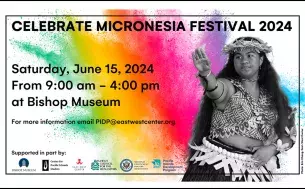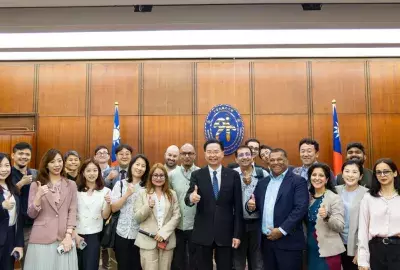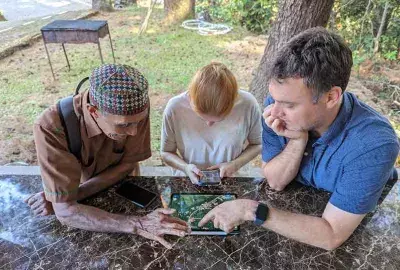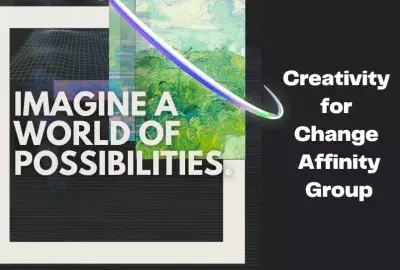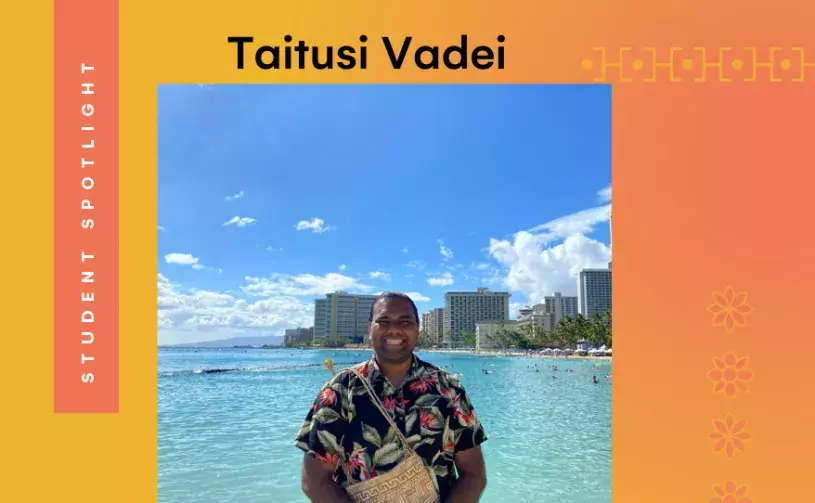
OFFICE/DEPARTMENT
Taitusi Vadei first came to Hawai‘i in 2021 to study for a Bachelor of Computer Science at the University of Hawai‘i at Hilo as part of the East-West Center’s US South Pacific Scholarship Program (USSP) program. USSP is a highly competitive, merit-based scholarship that supports master’s and bachelor’s degree studies at the University of Hawai‘i. Designed to increase the capacities of Pacific Island countries in meeting their developmental needs, USSP supports bright students like Taitusi to build their skills and knowledge to drive change and make an impact in key economic, social and environmental sectors.
During his time at Hilo, Taitusi studied with five other USSP recipients from Papua New Guinea, Solomon Islands, Vanuatu, Fiji, and Kiribati. This cohort strengthened his sense of Pasifika community, fostering a supportive environment where they could all thrive in a new place. This academic year, Taitusi and other USSP fellows have transferred to UH Mānoa, where they now reside with East-West Center graduate students and other short-term participants in the Center's Hale Mānoa dormitory. As one of the few undergraduates in this vibrant community, Taitusi says he appreciates the advice and support he receives from his graduate peers offering diverse perspectives and unique learning opportunities.
When discussing his plans for his Computer Science degree, Taitusi specifically expressed his ambition to become an educational technologist. Inspired by the technological trials and tribulations of learning in Fiji’s under-resourced education system, Taitusi aims to develop educational tools tailored to support students in the Pacific Islands. He shares that students in Fiji predominantly rely on traditional classroom-based learning with minimal and infrequent integration of technological tools and devices to enhance teaching and student learning. This disparity became prominent during the COVID pandemic when Fijian students and schools struggled to transition to remote learning. To bridge this gap, Taitusi hopes to work for the Fijian Ministry of Education post graduation in order to work closely with relevant education stakeholders in increasing the uptake of technology in Fijian classrooms.
Immersed in the EWC’s dynamic environment, Taitusi's journey extends beyond the EWC Education Program. As a former student intern in the Center’s Pacific Island Development Program (PIDP), one of his major duties was assisting PIDP with organizing and running the Pacific Islands Conference of Leaders (PICL) in 2022. Through this experience, he engaged with leaders from the Pacific Islands, including politicians, diplomats, and heads of state. Through PIDP, he was able to participate in events with high-level and distinguished Pasifika professionals in regional organizations. He highlights that the exposure has been rewarding, as it has shown him the varying kinds of work carried out in different parts of the Pacific and know more of regional issues. Taitusi mentions, “I’m thankful for the mentorship received from PIDP Director Dr. Mary Hattori and Deputy Director Dr. James Viernes during the summer institute.”
Beyond work and academics, Taitusi actively engages in activities that ground him in his culture. He engages with Pasifika clubs on campus such as the Pan Pacific Association, Pasifika Allies Association and TIDES-AANAPISI where he says he is learning more about other Pacific Island cultures, languages, and traditions. Moreover, he finds himself in spaces where he meets with other Pacific Island participants from the short term programs hosted by EWC such as the Resilient Pacific Island Leaders fellowship, Pacific Island Leadership Program, and Professional Fellows program to name a few. These kinds of gatherings have allowed him to forge new and meaningful friendships with the fellows. On top of this, Taitusi has taken part in UH Hilo’s International Night, where alongside Dr. Tarisi Vunidilo, an archaeologist at UH Hilo, he co-directed the Fiji group for the 2022 show, showcasing his Fijian culture to the diverse student population. This year at the Center’s annual East-West Fest, he danced with We Are Pasifika, a pan-Pacific group who performed nine Pacific Island dances.

When asked about his East-West Center experience, Taitusi said, “The East-West Center provides an avenue for people to come and meet together and join and connect.” He often finds himself spending time with his friends and fellow EWC residents at Hale Hālāwai, talking story, sharing food, and enjoying each other's company. “I am thankful for USSP for this opportunity to come [to Hawai‘i and East-West Center] and study because it is such a unique experience for someone from a Pacific Island nation to experience US education.”
The East-West Center Education Program offers scholarships for graduate study as well as affiliation programs for service-minded students with a focus on the Asia-Pacific region to join our international graduate student community.
Taitusi Vadei first came to Hawai‘i in 2021 to study for a Bachelor of Computer Science at the University of Hawai‘i at Hilo as part of the East-West Center’s US South Pacific Scholarship Program (USSP) program. USSP is a highly competitive, merit-based scholarship that supports master’s and bachelor’s degree studies at the University of Hawai‘i. Designed to increase the capacities of Pacific Island countries in meeting their developmental needs, USSP supports bright students like Taitusi to build their skills and knowledge to drive change and make an impact in key economic, social and environmental sectors.
During his time at Hilo, Taitusi studied with five other USSP recipients from Papua New Guinea, Solomon Islands, Vanuatu, Fiji, and Kiribati. This cohort strengthened his sense of Pasifika community, fostering a supportive environment where they could all thrive in a new place. This academic year, Taitusi and other USSP fellows have transferred to UH Mānoa, where they now reside with East-West Center graduate students and other short-term participants in the Center's Hale Mānoa dormitory. As one of the few undergraduates in this vibrant community, Taitusi says he appreciates the advice and support he receives from his graduate peers offering diverse perspectives and unique learning opportunities.
When discussing his plans for his Computer Science degree, Taitusi specifically expressed his ambition to become an educational technologist. Inspired by the technological trials and tribulations of learning in Fiji’s under-resourced education system, Taitusi aims to develop educational tools tailored to support students in the Pacific Islands. He shares that students in Fiji predominantly rely on traditional classroom-based learning with minimal and infrequent integration of technological tools and devices to enhance teaching and student learning. This disparity became prominent during the COVID pandemic when Fijian students and schools struggled to transition to remote learning. To bridge this gap, Taitusi hopes to work for the Fijian Ministry of Education post graduation in order to work closely with relevant education stakeholders in increasing the uptake of technology in Fijian classrooms.
Immersed in the EWC’s dynamic environment, Taitusi's journey extends beyond the EWC Education Program. As a former student intern in the Center’s Pacific Island Development Program (PIDP), one of his major duties was assisting PIDP with organizing and running the Pacific Islands Conference of Leaders (PICL) in 2022. Through this experience, he engaged with leaders from the Pacific Islands, including politicians, diplomats, and heads of state. Through PIDP, he was able to participate in events with high-level and distinguished Pasifika professionals in regional organizations. He highlights that the exposure has been rewarding, as it has shown him the varying kinds of work carried out in different parts of the Pacific and know more of regional issues. Taitusi mentions, “I’m thankful for the mentorship received from PIDP Director Dr. Mary Hattori and Deputy Director Dr. James Viernes during the summer institute.”
Beyond work and academics, Taitusi actively engages in activities that ground him in his culture. He engages with Pasifika clubs on campus such as the Pan Pacific Association, Pasifika Allies Association and TIDES-AANAPISI where he says he is learning more about other Pacific Island cultures, languages, and traditions. Moreover, he finds himself in spaces where he meets with other Pacific Island participants from the short term programs hosted by EWC such as the Resilient Pacific Island Leaders fellowship, Pacific Island Leadership Program, and Professional Fellows program to name a few. These kinds of gatherings have allowed him to forge new and meaningful friendships with the fellows. On top of this, Taitusi has taken part in UH Hilo’s International Night, where alongside Dr. Tarisi Vunidilo, an archaeologist at UH Hilo, he co-directed the Fiji group for the 2022 show, showcasing his Fijian culture to the diverse student population. This year at the Center’s annual East-West Fest, he danced with We Are Pasifika, a pan-Pacific group who performed nine Pacific Island dances.

When asked about his East-West Center experience, Taitusi said, “The East-West Center provides an avenue for people to come and meet together and join and connect.” He often finds himself spending time with his friends and fellow EWC residents at Hale Hālāwai, talking story, sharing food, and enjoying each other's company. “I am thankful for USSP for this opportunity to come [to Hawai‘i and East-West Center] and study because it is such a unique experience for someone from a Pacific Island nation to experience US education.”
The East-West Center Education Program offers scholarships for graduate study as well as affiliation programs for service-minded students with a focus on the Asia-Pacific region to join our international graduate student community.




